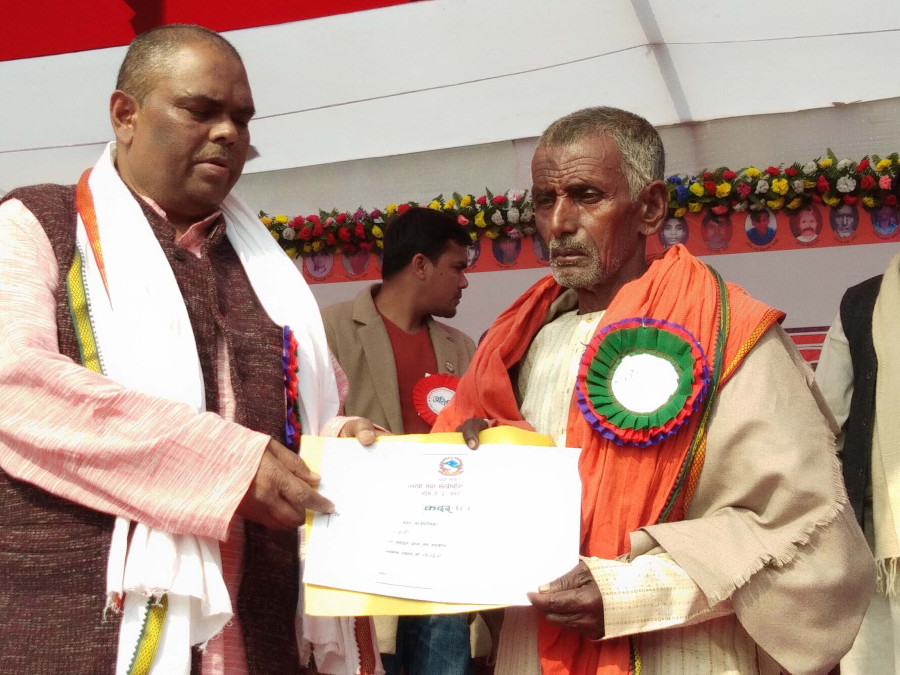National
12 years after Madhes Movement, gains are yet to be institutionalised
The Madhesi people’s fight against oppression, injustice and discrimination has a long history, dating back to the times when the Ranas ruled the country.
Tika R Pradhan
The Madhesi people’s fight against oppression, injustice and discrimination has a long history, dating back to the times when the Ranas ruled the country. But the one movement that indeed brought the Madhesi agenda directly to the centre, Kathmandu, and ensured substantial space in Nepal’s political landscape started 12 years ago on this day (January 19).
In 2006, then Maoist rebels agreed to lay down their arms and join mainstream politics. A year later, the Madhesi people sensed that the Maoist party had lost interest in the federalism they fought for, and they launched a struggle. Upendra Yadav, a firebrand Madhesi leader, was detained for burning a copy of the interim constitution. To protest the arrest of Yadav, there were demonstrations in districts along the plains. Ramesh Mahato, a 16-year-old student, was part of a protest in Lahan where he was shot dead allegedly by a Maoist cadre. This fuelled the Madhesi protest further and then ultimately took the shape of Madhes Movement.
The 2007 Madhes Movement is one of the milestones in Nepal’s political journey. But Madhesis still question, 12 years later, whether the sacrifices they made have paid off.
There have been some achievements, but political course is yet to be completed, say political analysts.
Madhesi people were expecting three things—electoral constituencies on the basis of population, ensuring proportional representation and federalism. But more than three years after the promulgation of new constitution, dissatisfaction still remains among the Madhesi people.
Madhesis were involved in three phases of revolt—first in 2007, second in 2008 and the third in 2015, but with dissatisfaction still continuing people of Madhes commemorate the first Madhes revolt every year.
“Theoretically all three Madhes revolts remained successful but politically they all failed,” claims CK Lal, a commentator and political analyst. Asked about the reasons behind the failure, Lal said that for any movement to become successful they must be guided by an ideology but that has not been established yet. Secondly there must be an organisation, which is weak, and thirdly a strong leadership, which is divided and fragmented. Lal says nothing is predictable in politics. “If dissatisfaction persists, who knows when it will erupt,” he warned.
After the 2015 movement in the run-up to the constitution promulgation, which claimed more than 50 lives in different districts along the plains, Madhesi parties lost the plot. The constitution was promulgated in September that year, and a game of musical chair started again, with Madhesi parties happily becoming part of the game.
The Sanghiya Samajbadi Forum-Nepal (SSF-N) joined the Oli government while the Rastriya Janata Party-Nepal (RJP-N) has been supporting the government from outside after the ruling parties promised amendment to the constitution. But the constitution is yet to be amended basically to address the issues of citizenship and proportional inclusiveness.
Since the government has forged some kind of agreement with both the SSF-N and RJP-N, which are expecting that Oli would take steps towards that end. To amend the constitution for incorporating the demands of Madhesis and Janajatis, analysts say there must be strong pressure on the government, which is not in sight as of now.
“The parties have already lost whatever the trust they had gained during the 2015 movement. People have many questions for the leaders,” said Surendra Labh, a political analyst.
However, Shyam Shrestha, also a commentator and political analyst, said the major issue of the Madhes Movement was that of identity and proportional representation in the state mechanism, which was well established. But they are yet to be implemented, he said. “Madhesi parties are leading Province 2 and have a significant hold in the federal parliament, which gives them leverage to influence the power game,” said Shrestha, adding that the representation of Madhesi and other disadvantaged groups was also increasing even though that is not satisfactory.
Labh, who is also a university professor, says there are other major issues as well which the parties have failed to take note of.
“If the issues of poverty and untouchability were also raised along with other core issues, the scenario could have been different by now,” said Labh.




 8.67°C Kathmandu
8.67°C Kathmandu















